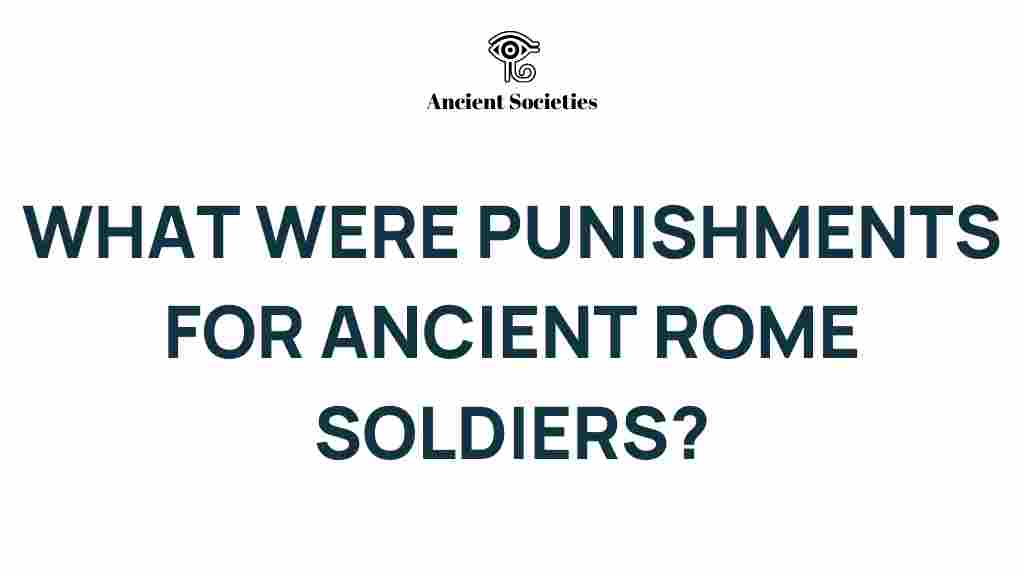The Harsh Realities: Punishments for Ancient Roman Soldiers
Throughout history, few military forces have matched the effectiveness and discipline of the Roman legions. The Ancient Rome empire was known for its vast territories, remarkable architecture, and complex social structures. Yet, underlying this power was a strict system of military discipline that governed the lives of its soldiers, or legionnaires. This article explores the harsh realities and punishments faced by soldiers in Ancient Rome, highlighting the culture of justice and order that defined the empire.
The Military Structure of Ancient Rome
The Roman military was a well-oiled machine, structured around the principles of discipline, loyalty, and hierarchy. Soldiers, known as legionnaires, were typically recruited from the citizen classes of Rome and its provinces. They underwent rigorous training and were expected to adhere to strict codes of conduct. To maintain order and effectiveness within the ranks, punishments were meted out for various offenses. Understanding these punishments gives us insight into the culture and history of the Roman military.
Common Offenses Leading to Punishments
In Ancient Rome, soldiers could face punishment for a variety of offenses, including:
- Desertion: Leaving the battlefield without permission was considered one of the gravest offenses.
- Insurbordination: Disobeying orders from superiors could lead to severe consequences.
- Failure to maintain equipment: Soldiers were responsible for their gear, and neglect could result in punishment.
- Cowardice: Showing fear in battle or retreating prematurely was heavily penalized.
- Disrespect: Insulting fellow soldiers or superiors undermined the discipline of the unit.
The Nature of Punishments in Ancient Rome
Punishments in the Roman military varied in severity, depending on the offense and the discretion of commanding officers. Here are some of the most common forms of punishment:
- Flogging: A common punishment for minor infractions, soldiers could be whipped as a means of correction.
- Reduction in pay: Fines could be imposed for various offenses, impacting a soldier’s financial stability.
- Imprisonment: Soldiers could be confined for a period, often in harsh conditions, as a deterrent.
- Decimation: A brutal form of punishment where one in every ten soldiers was executed as a means of collective punishment for a unit’s failure or cowardice.
- Execution: In extreme cases, particularly for desertion or treason, soldiers faced death as the ultimate punishment.
The Philosophy Behind Military Discipline
The harsh punishments in the Roman military were rooted in a philosophy of discipline that was crucial for maintaining order and effectiveness in warfare. The leadership understood that a well-disciplined army was essential for the expansion and protection of the empire. The emphasis on discipline reflected the broader cultural values of Ancient Rome, where societal order and respect for authority were paramount.
Impact of Punishments on Soldier Morale
While the system of punishments was designed to enforce discipline, it also had complex effects on soldier morale:
- Fear and Compliance: The threat of punishment ensured that most soldiers complied with orders.
- Resentment: Severe punishments, especially decimation, could lead to resentment among troops, undermining unity.
- Honor and Valor: The culture emphasized honor, and many soldiers were motivated to avoid punishment by proving their bravery in battle.
Case Studies of Notable Punishments
Throughout Roman history, several notable incidents of punishment have been recorded. These cases serve as examples of how the military discipline was enforced:
- General Crassus and the Spartacus Revolt: During the Third Servile War, Crassus famously used decimation as a punishment for his troops, showcasing the lengths to which Roman commanders would go to maintain control.
- The Punishment of the Legio IX Hispana: After a series of defeats, this legion faced severe repercussions, including the execution of a large number of its soldiers as a warning to others.
Comparative Analysis with Other Cultures
When examining the punishments of Ancient Roman soldiers, it is insightful to compare them with military practices in other cultures:
- Spartan Discipline: Like the Romans, Spartans had harsh military codes, but their focus was more on communal honor rather than individual punishment.
- Medieval Knights: Punishments in medieval Europe differed, often involving chivalric codes and less corporal punishment.
Modern Perspectives on Ancient Punishments
Today, historians and military scholars analyze the punishments of Ancient Rome to understand the evolution of military discipline and justice. The strict measures employed by the Romans raise questions about the balance between order and morale. Modern military forces often draw lessons from these historical practices, emphasizing the importance of leadership and respect in maintaining discipline.
Troubleshooting Tips for Understanding Ancient Military Discipline
For those interested in delving deeper into the complexities of military discipline in Ancient Rome, consider these tips:
- Read primary sources such as Caesar’s Commentaries or Polybius’ Histories for firsthand accounts of military life.
- Explore archaeological findings that provide context to the living conditions and experiences of legionnaires.
- Engage with modern interpretations and analyses by historians to understand the broader implications of Roman military practices.
Conclusion
The punishments faced by soldiers in Ancient Rome were a reflection of the empire’s values and its commitment to military discipline. The strict enforcement of rules, while sometimes brutal, was seen as necessary for maintaining order and effectiveness in warfare. Understanding these harsh realities provides valuable insights into the culture and history of one of the most powerful empires in human history.
For further reading on the history of Ancient Rome and its military practices, you might find this resource helpful: Ancient Roman Military History.
As we look back at the lives of those who served as legionnaires, we can appreciate the rigorous demands placed upon them and the sacrifices made in the name of the empire. The legacy of their discipline continues to influence military practices around the world today.
This article is in the category History and created by AncientSocieties Team
